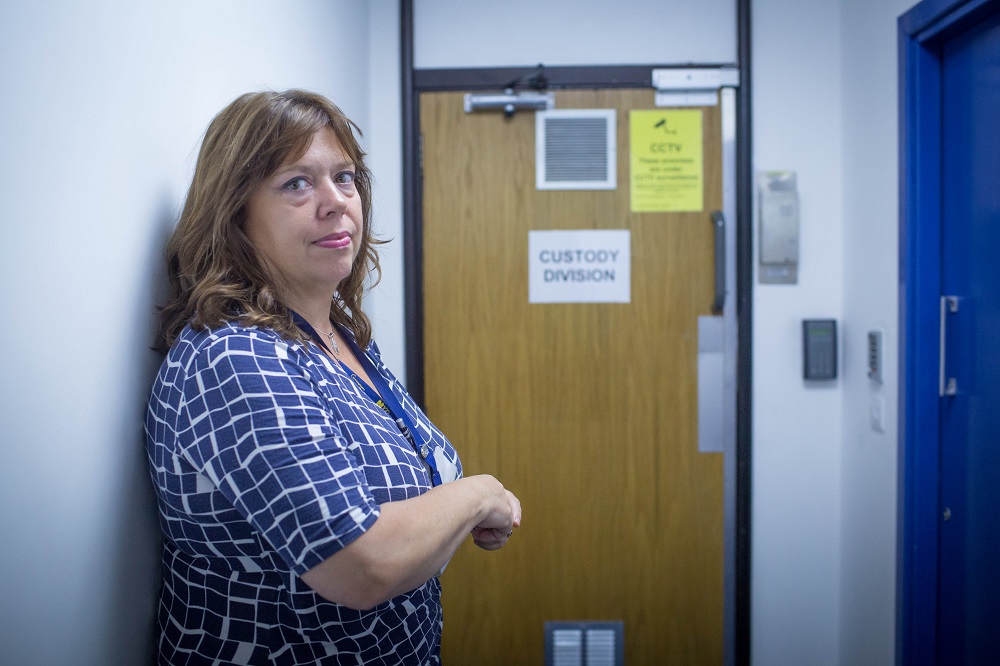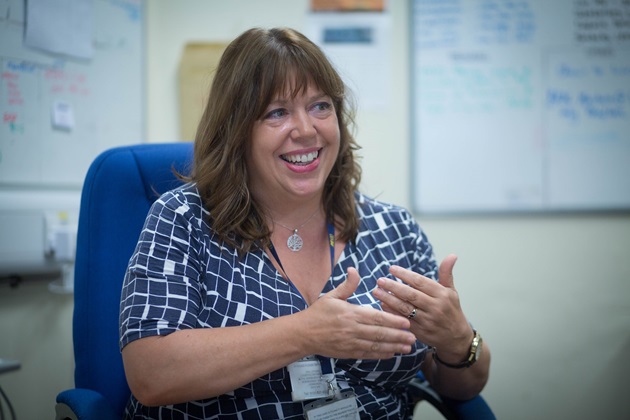Jess is pushing for the law to be changed in Scotland, so victims of sexual assault are better supported, and nurses play a bigger role in collecting and presenting forensic evidence in their cases
When Jess Davidson qualified as a nurse 23 years ago, little did she imagine it would take her from A&E to a mental health nursing degree, then to forensic nursing. Nor that she’d be fighting to change the law around rape and sexual assault in Scotland.
“Life changes so much,” muses Jess. It’s not quite the career trajectory she’d first planned, when her main concern was getting in the shifts to support her young family. But the skills she learnt then in dealing with trauma have informed her forensic nursing in a way she never imagined.
Now an RCN fellow, Jess finds herself not just on the frontline helping collect forensic evidence for the courts, she's also at the forefront of fundamental changes in the way evidence is collected in Scotland, particularly in rape and sexual assault trials.
If a person can be examined in complete confidence, you can start to build a therapeutic relationship and begin the process of recovery
If things go to plan, proposed legislation currently passing through the Scottish parliament would put the health and wellbeing of the person being examined on an equal footing with gaining crucial evidence.
And, in a ground-breaking proposal, it would mean someone who had been a victim of rape or sexual assault could be examined and evidence collected immediately after the incident, without having to report the alleged crime to the police. To support this legislative change the Scottish government has announced funding for an initiative to develop the role of sexual health nurse examiners and to put nurses’ evidence on a par with that of doctors. Progress Jess sees as vital.
“If a person can be examined in complete confidence, without having to go through the traumatic experience of giving police statements, you can start to build a therapeutic relationship and begin the process of recovery,” she says. “Having already gathered the evidence, you can then work with, and help, that person.”

Jess's decision to shift her career came when she worked in A&E and realised some people draw the bad cards in life often through no fault of their own. “Many of the routes to trauma are guided by poverty, bad decisions, drunk decisions or people who are not thriving because awful things have happened to them,” says Jess.
She went into mental health nursing in Edinburgh in 2006 and worked as a bank nurse in police custody cells before moving, in 2009, to her current post as a senior clinical forensic charge nurse.
“Working in custody was like a marriage of absolutely everything,” she says. “I’d done quite a lot on challenging behaviour, and outreach for women involved in the criminal justice system. I also had A&E experience and had been a community psychiatric nurse,” she says.
Expanding the nurses’ role
Jess’s team covers eight primary centres and 97% of the custody work in them is now done by nurses. That includes taking blood samples from drivers who are under the influence of drink or drugs, assessing people for a mental health problem or learning disability and deciding whether a person is too tired, drugged or drunk to be seen by a court.
Jess was seconded for a year from April 2013 to build a new model of care for forensic nursing, expanding the nurses’ role. “There was a great response from everybody on how well the nurses were picking up this work,” she says.
And so, it’s been Jess’s mission to extend the forensic nurse role further, working as part of the national implementation group for custody and forensic health care in Scotland, which is behind the proposed law change.
As part of this work, Jess discovered a disparity in Scotland where forensic nurses have not been able to undertake full forensic examinations as a skilled witness. “Nurses have been doing examinations in England, America and Canada. But here in Scotland, we have to fulfil the higher requirements of the Scottish courts,” says Jess.
The Scottish Government is going to provide £200,000 to run a trial of the proposed changes. Alongside this, two post-graduate forensic nursing courses are being developed at Edinburgh and Staffordshire universities. If approved, these will start later in 2020, with equal competencies for students in both England and Scotland.
While her practice has evolved over the years, Jess has never lost sight of her roots in A&E. For instance, a woman was recently in the forensic suite after domestic abuse. During the examination, a member of Jess’s team entered to say that social services were about to take her three children into care. The woman wanted to leave immediately. “Previously I may have said ‘you mustn’t leave’. But everything we do now is ‘you can leave any time’.”
Previously I may have said ‘you mustn’t leave’. But everything we do now is ‘you can leave any time’
Jess focused on the woman and her needs – not just the forensic imperatives –while others reassured the woman her children were fine. It reminds Jess of being in A&E, helping with the shock and trauma after a road traffic accident, as well as the injury. “I’d maintain eye contact, keep them with me. It’s about bringing someone back to a safe place. It’s just the same.”
What the RCN says…
The RCN has been supporting Jess’s work to expand the role of forensic nurses in Scotland and welcomes the proposed legislative changes.
Theresa Fyffe, Director of RCN Scotland, who mentors Jess, says: “Timely access to suitably qualified, experienced and skilled professionals should be a right for anyone who has suffered rape or sexual assault.
“Developing the role of nurse sexual offence examiners to undertake forensic medical examinations will improve access and make a real difference to providing the right care, at the right time following the trauma of rape and sexual assault.
“We’re very proud of Jess and the role she has played in achieving recognition that nursing is part of the solution.”
Pictures by Elaine Livingstone courtesy of the Queen's Nursing Institute Scotland
Celebrating International Year of the Nurse and Midwife
Jess is one of 17 case studies in an RCN report which demonstrates how nursing helps to achieve the United Nations sustainable development goals.
This is being published as part of our celebrations for International Year of the Nurse and Midwife.
Jess is also Chair of the RCN Nursing in Justice and Forensic Health Care Forum. Find out more.








